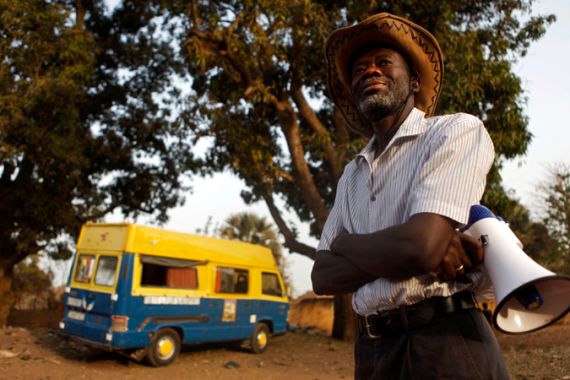Guinea-Bissau counts presidential poll votes
Nine candidates in race in presidential poll in West African nation, necessitated by death of President Bacai Sanha.

Votes are being counted in the instability-prone West African nation of Guinea-Bissau to elect a successor to Malam Bacai Sanha who died two years into his term, even as a former military intelligence chief was shot dead.
Colonel Sama Diallo was jailed in 2010 after taking part in a military coup, but had stayed away from politics since then. The motive behind his killing was not immediately known.
Nearly 600,000 people were elegible to vote in Sunday’s election, which featured a crowded field of nine candidates including former president Kumba Yala, who was overthrown in a 2003 coup.
| In Numbers | ||||||||
|
The vote followed Sanha’s death in January and came just two years after the late president’s election in an emergency ballot after Joao Bernando Vieira, his predecessor and the country’s dominant political figure, was gunned down inside his home.
Rather than bringing stability, the 64-year-old had spent much of his presidency shuttling between hospitals in Europe and Africa, for what his aides described as “routine checkups”.
Five of the nine candidates running for office this time around also ran in 2009. Even their campaign posters and slogans were largely recycled. As well as Yala, the frontrunners also included Carlos Gomes Jr, a former prime minister.
“For us, it’s really a case of history repeating itself,'” said Guinea Bissau-based political analyst Rui Landim.
“We have little hope that anything will change. You can see it in the campaign. There’s very little enthusiasm. At the rallies, there are very few people. … It’s a race between the people already in power,” he said.
Cocaine trade
Guinea-Bissau gained independence from Portugal in 1974 after an 11-year conflict, but since then its history has been punctuated by unrest, with three presidents toppled in coups and another, Vieira, who was president for almost two decades in three spells in power, assassinated in 2009.
Besides political upheaval, Guinea-Bissau has been destabilised by a booming cocaine trade, which has turned its islands into vital staging posts between South America and Europe for Latin American drug cartels.
In 2010, the US Department of the Treasury declared two high-ranking members of the country’s military as drug kingpins, freezing any assets they might have had in the United States.